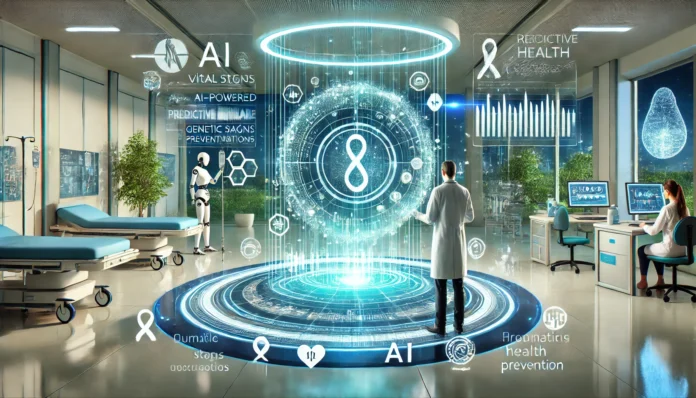In recent years, artificial intelligence (AI) has begun to revolutionize healthcare by enabling predictive models that forecast diseases before they manifest. AI’s ability to analyze massive amounts of data and identify hidden patterns has the potential to reshape how we approach disease prevention, diagnosis, and personalized treatment. This shift toward predictive healthcare could lead to earlier interventions, more precise treatments, and better outcomes, transforming the healthcare landscape.
The Rise of Predictive Healthcare
Predictive healthcare leverages AI technologies to forecast future health issues based on an individual’s genetic, environmental, and lifestyle data. These AI models do not simply react to existing symptoms but anticipate potential health risks before they become evident, offering a window for preventive care.
How It Works
- Data Collection and Analysis: AI systems ingest vast amounts of data from patient medical records, wearables, genetic testing, lifestyle information, and more.
- Pattern Recognition: Machine learning algorithms are used to detect subtle patterns within this data that humans might overlook. For example, AI can flag early signs of chronic conditions like heart disease or diabetes.
- Risk Prediction: AI models then generate risk scores, identifying individuals who may be predisposed to certain diseases and recommending early interventions.
AI in Early Disease Detection
One of the most promising aspects of AI in healthcare is its ability to detect diseases earlier than traditional methods, improving the chances of successful treatment.
Cancer Prediction
- AI systems like Google’s DeepMind have been used to predict the development of cancer by analyzing medical imaging data. In breast cancer, for instance, AI has shown the ability to detect tumors with greater accuracy than human radiologists.
- PathAI uses machine learning to assist pathologists in identifying cancerous cells in biopsies, enabling faster diagnoses and better-informed treatment decisions.
Cardiovascular Disease
- Wearable devices equipped with AI, such as the Apple Watch, can monitor heart rate and ECG data in real time, sending alerts when irregularities like arrhythmias are detected. These devices may detect problems months or even years before symptoms become noticeable.
- HeartFlow uses AI to create a 3D model of a patient’s coronary arteries, helping doctors predict the likelihood of a heart attack, enabling earlier interventions like lifestyle changes or medical treatment.
AI in Personalized Healthcare
While predictive healthcare is largely about early detection, it also holds the potential to tailor treatment to the individual. AI can personalize a patient’s care plan based on data-driven insights into their unique health risks and needs.
Genetic-Based Medicine
- AI models, such as those used by Tempus, analyze genetic information to identify potential risks for diseases like cancer or diabetes. By analyzing a person’s genomic data, AI can suggest personalized treatment plans or even predict how they will respond to specific drugs.
- 23andMe, a personal genomics company, uses AI to interpret genetic data, providing insights into potential hereditary health risks and allowing for more informed preventive measures.
Lifestyle-Based Recommendations
- AI-powered platforms like Omada Health focus on diabetes prevention by tracking patients’ lifestyle choices such as diet, exercise, and sleep patterns. The platform’s AI system uses this data to offer tailored advice that aims to lower an individual’s risk of developing Type 2 diabetes.
- Similarly, fitness trackers like Fitbit and Whoop monitor physical activity, sleep, and stress levels, and AI analyzes the data to offer health insights and tips for maintaining overall well-being.
AI in Predicting Global Health Trends
AI is also making waves in public health by predicting global health trends, identifying disease outbreaks, and optimizing resource allocation.
Epidemic Forecasting
- AI platforms such as BlueDot and HealthMap use machine learning to track global news, medical reports, and social media for signs of potential outbreaks. BlueDot famously predicted the outbreak of COVID-19 days before the World Health Organization (WHO) issued its official alert.
- By analyzing patterns in travel, population density, and climate, AI can also predict where diseases like malaria or dengue are likely to spread, helping governments and healthcare organizations allocate resources more effectively.
Global Health Policy
- In the aftermath of the COVID-19 pandemic, AI is increasingly used to forecast healthcare system strain, project the need for hospital beds, and predict vaccination rollout outcomes. AI-driven platforms like IBM Watson Health are assisting policymakers in making data-informed decisions to tackle future health crises.
Challenges and Ethical Considerations
While AI in predictive healthcare offers immense promise, it also raises important challenges and ethical considerations:
- Data Privacy: The use of personal health data to predict diseases raises concerns about privacy and data security. Healthcare organizations must ensure that AI systems comply with regulations like HIPAA (Health Insurance Portability and Accountability Act) to protect patient information.
- Bias in AI Models: AI systems trained on biased data can produce inaccurate predictions, especially in diverse populations. For example, if training data is predominantly from one demographic group, the AI model may be less effective at predicting outcomes for others.
- Access to Technology: Predictive healthcare technologies may not be accessible to all populations, especially those in low-income or rural areas. The cost of AI-powered diagnostic tools and genetic testing may limit access to these services, exacerbating health disparities.
The Future of Predictive Healthcare
As AI continues to evolve, its role in healthcare will become more significant. Predictive models will improve in accuracy, offering personalized and proactive solutions that help individuals maintain their health. With advancements in AI, the dream of a truly preventive healthcare system is becoming a reality—one where disease is identified before it manifests, and treatments are tailored to each individual’s unique genetic and lifestyle profile.
In the future, AI could make healthcare more personalized, accessible, and effective, leading to longer, healthier lives for people around the world.





